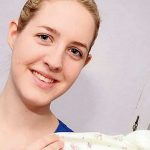The High Court has dismissed a University of Bristol appeal over a ruling that it contributed to the death of a disabled student who took her own life.
Physics student Natasha Abrahart, who suffered severe social anxiety, died in April 2018 on the day she was due to give an oral presentation to students in a 329-seat lecture theatre.
In May 2022, Ms Abrahart’s parents successfully sued the university, with Bristol County Court finding it contributed to her death by discriminating against her on the grounds of her disability.
It found the university breached its duty to make “reasonable adjustments” to the way Natasha was assessed, and was ordered to pay more than £50,000 in damages and funeral costs.
The court previously heard Ms Abrahart, 20, had made another suicide attempt in the winter term and that university staff were aware she was struggling.
Mr Justice Linden ruled on Wednesday that the university had failed on all seven of its grounds of appeal.
He said Natasha was “very much under pressure to attend the interviews at the presentation [on the day of her death]”.
Natasha’s father, Bob Abrahart, had issued a cross-appeal that the university had a duty of care to Natasha, but the judge said it was “not necessary” for him to “express any view, one way or the other”.
Mr Abrahart and his wife Maggie want the government to bring in a statutory duty of care for universities towards their students.
Speaking outside court, he told Sky News that universities had been “ignoring part of the Equality Act, disadvantaging students – disabled students”.
He said that, following the ruling, “they now know they will be liable if they break the law”.
Natasha’s mother, Maggie Abrahart, said universities need to “look at what they’re doing and whether their systems and processes are causing unnecessary distress”.
“We’ve got approximately 100 students take their own life every year,” she said.
“We’ve spoken to so many families who feel a duty of care is partly responsible is partly responsible for the death of their child.”
University of Bristol vice-chancellor Professor Evelyn Welch said Natasha’s death was “a tragedy” and that she is “deeply sorry for the Abrahart family’s loss”.
In a longer statement, the University of Bristol said “mental health and wellbeing is a priority and is at the heart of everything we do”.
“In appealing, we were seeking clarity for the Higher Education sector around the application of the Equality Act when staff do not know a student has a disability, or when it has yet to be diagnosed,” it added.
The university thanked its staff who “work tirelessly to support all our students and to those who specifically supported Natasha, which included a referral to the NHS”.
It added that in 2022 it became one of the first to get the University Mental Health Charter Award.
“We know there is always more to do, and we will keep working to achieve the best for everyone in our community,” said the university.
:: Anyone feeling emotionally distressed or suicidal can call Samaritans for help on 116 123 or email [email protected] in the UK. In the US, call the Samaritans branch in your area or 1 (800) 273-TALK.






















